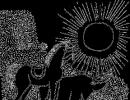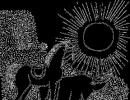Caligula horse. Standard troll. Why the Senate hated Caligula and forgave the common people Horse of Emperor Caligula
Artistic comparison is used not only for rhetoric, but in order to somehow explain to a third party a sensory experience that was previously unfamiliar to her, in the absence of the closest analogues for comparison.
If anyone has read Garrison, they remember how the hairy, primitive Neanderthal Paramutan explained to the equally primitive but sober Cro-Magnon hunter Kerrick the pleasures of drinking "fire water."
It's as good, - said the paramutan, - as eating a fresh liver, lying on a woman.
The kind and direct Neanderthal simply combined the highest values in his life - to eat and fuck, and in this way described the sensory experience of drinking in the hut of single hunters. And note - he did not say that the sensations are the same as eating a liver during intercourse. He said - "it's just as good." "The same" and "the same" are two different things.
Kerrick tried to drink from a wineskin, got into a hard hangover and said "yes, that's good, but next time we'd better give a liver and a woman." He, too, in his primitive simplicity, believed that the comparison was direct. But it turned out that you suddenly become stupid, you will laugh and sing for no reason, and in the morning you will have a headache and dryness.
Then people developed from the Stone Age to the Space Age, and for comparison they began to use all sorts of diagrams, graphs and video presentations, such as “how many matchboxes can be laid out from the Earth to the Sun”, or “what will happen to a horse from a drop of nicotine”.
And here it must be clearly understood that comparisons are often entertaining, and are used for the sake of the comparisons themselves, and not at all for the transfer of sensory experience. People don't need to know how many matchboxes you can fit between a star and a planet. It's just that they don't give a fuck so much that this knowledge entertains them. In the same way, the hunter Kerrick, who was caught in the winter in the camp of the Paramutans, did not fucking do it. And from the entertainment until spring, only reindeer liver, women and fly agaric tincture remained.
But as soon as the winter ended, Kerrick began to write down not moonshine recipes, but the composition of Paramutan poison for hunting large vertebrates. This was absolutely helpful information, for the sake of which it was worth the whole polar winter to turn off moonshine from stainless steel in the company of Bigfoot.
On the eve of the elections, I receive valuable information that Zelensky is not a clown, but an artist. The artists were Reagan, the president of America, and Schwarzenegger, who wanted to but couldn't. Nero was an artist by vocation, and what an artist Fuhrer Schicklgruber was, so this is generally a song of the Nibelungs.
But here the same distortion of the transfer of sensory experience occurs, as in the case of comparing moonshine and liver, dick and tram handle, chess and preference.
Reagan was not just a trade unionist and governor of California (as even children already know). He was one of the most scandalous governors of the States. Even before he became president, he was presented in the USSR as a fierce obscurantist and necromancer. No kidding, books have been published about him. For example, when I was a pioneer under Jimmy Carter, I knew that Reagan hated nature - he said "whoever saw one sequoia saw them all" and allowed the cutting of relic trees.
The sensory experience from President Reagan was not that he was an artist. He was in what Roni said, “California girls. You freaked out. Do you need roads in the state or sequoias? Pick one. I promised you roads. Choose another governor - and then you will not have roads, but there will be sequoias. These are your sequoias, and your roads. I'm just serving your interests."
He did not say - ask for whatever you want, I will promise everything, the main thing is that you vote for me again. He said - I already promised you everything. And I already do
You can imagine what eggs you need to have in order to say similar in a country where the words “woman” and “Negro” are insults, the rights of turkeys are protected by Congress, and the male derivative of the word “cook” is not “cook”, but “cook” .
Schwarzenegger did not become famous as an artist at all. Arnolik began acting in films, already being a millionaire. After emigrating from Austria as a bodybuilder, he went into the construction business and put up so many bricks for sale that the first film was of no commercial interest to him. Then he starred because the fans asked him about it.
The brilliant DiMaggio conquered the country not only by being a baseball idol and the husband of Marilyn Monroe. He is the only one who came to her funeral with sincere grief. A dumb blonde dumped a dumb jock for being dumb, what could be more eloquent? What artistic comparison can be used here? In terms of stupidity, it's like eating a liver while lying on a woman.
Neither smart Arthur Miller, Marilyn's next husband and owner of a Pulitzer, nor the whole Kennedy family, who banged her in turn, came to see the stupid blonde on her last journey, who, with the help of special services, had overindulged in luminal. "Why are you here?" DiMaggio was asked at the funeral.
Well, how ... well, this ... well, in general ... I promised, both in sorrow and in joy, and until death do us part ...
And at that moment, everyone in America stopped being funny. And the one who called Joe DiMaggio a "muscular idiot" suddenly felt like an idiot without muscles.
You understand, he behaved like a man not because he was an athlete. Vice versa.
Chaplin and Purviance, Edith Piaf and Marcel Sedan. Grigory Skovoroda was offended by the tycoon's rudeness and left straight from the table into the night barefoot, leaving a plate of refreshments. A hundred out of the yard were sent in pursuit of him, but they did not catch up. "The world caught me..."
Artists, sculptors, philosophers, artists, musicians - they did not get into politics because they were good at drawing, dancing beautifully or joking funny. Just at a certain moment they showed unusual facets of the soul. And "new faces" came to world politics not because they are new.
So you can catch any passer-by on the street, the face is clearly newer than that of the politicians who have fucked all the politicians from the TV.
But the scale of the personalities of the "artists-athletes" was such that it inevitably pushed a person into social service, and the media flair and paparazzi sparkles were a secondary effect.
And choosing a person because of the secondary effect of popularity is like eating deer liver on a woman, and in the morning being surprised by a hangover. It's about the same, but somehow not like that.
***
To end this literary epic of primeval hunters, baseball champions, and blue-bearded presidents.
There was such a Roman emperor Caligula. Also, in a sense, an artist. He played the roles fucking, and he was eventually stabbed to death along with his pregnant wife. After the performance, as a result of a conspiracy organized by Cassius Hereia.
But the problem was that he appointed his horse, the Initiate, as a senator. And it was impossible to expel a horse from the Senate. Killing Caesar is still all right, but the horse in the Senate was not guilty of anything, especially since the senators themselves confirmed his candidacy.
Sho writes about this guide.
« After the murderemperorin defense of Incitatus, it was said that, unlike other senators, he did not kill anyone and did not give the emperor a single bad advice. Senators also faced a problem: according to Roman law, before the end of the term, no one from the Senate, even a horse, could be expelled. Then the emperor Claudius found a way out: Incitatus was cut off his salary, and he was removed from the Senate, as not passing on financialqualification"
Because they chose a horse. Under pressure or not, the horse was brought into the Senate. And there was no way to kill him. Rome was built on the inviolability of the horse in the Senate. Caesar is a matter of life. Not one is the other. But knock out a stone from under the election, and then the whole SPQR will be indignant - what are we actually building on? On what right and what word? And why, then, cannot a slave slaughter his master if he succeeds in stealing the sword? And why did the senators, such greyhounds without Caligula, dutifully agree to a horse under a despot? And why not slaughter the rest of the senators then? Moreover, some of them are not very different from horses?
Now they bring a horse to us. Like a new face.
Already tried the "red director". Already tried the "European beekeeper". We have already tried the “normal kid in authority”. But as soon as something more or less began to work out, there was a desire to try a “new face”.That's a bitch two terms of Kuchma, with all his pizdets and horses in the Senate - no one wanted new faces. But when the aggressor stands four hundred meters from our chicken coop, a “new face” is suddenly required, right now, and not later or earlier.
In that case, if an artist is unavoidable, I vote forDinklage.
A dwarf, an invalid and an outcast, he became world famous for his role as Tyrion Lannister. Also a movie politician. But. Which, unlike the spherical media blue-beard, ruled without the help of the Dnieper oligarchs and did not ask from the budget for filming. Who realized himself both in the media and in realitythlife.
In the movies, he fought against his family, separatists, pirates, dragons, religious obscurantists.Personally participated in hostilities. He loved one woman all his life.I never compared my unfortunate homeland with a prostitute. And once voluntarily gave up power in favor of the general welfare.
But in reality, he is at least a cooler media figure than Zelensky. He is known by monarchs and presidents.
Governor Schwarzenegger - Terminator. President Reagan - Oscar nomination with Kings Row. Peter Dinklage - three Emmys and a Golden Globe.
Ukraine - goloborodko, television of the Galaseevsky district, champion of the kaveen. Or not a champion. But what a difference.
You know what. If you have definitely decided to choose a horse for the Senate, choose at least a thoroughbred pacer, and not a furred hinny from the quarters. If an artist - then Dinklage, If a playwright - then Havel, If an artist ... well, let it not be Hitler, let it be crazy Diego Rivera. If a writer, then Hemingway. If the producer and showman - then Trump. If the oligarch - then Rockefeller, not Kolomoisky. If a crook, then Professor Moriarty, not Yanukovych. If an athlete, then DiMaggio, not Onopka.
It was an artistic comparison. Like eating liver on a woman. Since rational arguments no longer work, one has to explain how a Neanderthal is a Cro-Magnon. Shaw "the same" and "the same" are two different things.
And sho was clear even to primitive Cro-Magnons.
Could not shine, shining in gold.
Good deeds shine!"
So wrote the real Privy Councilor, the future Minister of Justice Russian Empire Gavrila Romanovich Derzhavin.
Some contemporaries believed that Gavrila Romanovich somewhat disliked senators in general. But he died just in time, you know what he did in the coffin.
And Alexey Mikhailovich Zhemchuzhnikov answered him, from a certain point of view he is better known to us not as an employee of the Senate, but as the Director of the Assay Chamber Kozma Prutkov:
"So Derzhavin played with words,
Embraced by indignation.
And I surrender (guilty!),
That Caligula is famous for that,
What the horse thought, they say
Send to be present in the Senate.
I remember: in my youth I captivated
His irony me;
And my thought painted
Within the walls of the sacred tribunals,
Among the dignitaries, a horse.
Well, was he out of place there?
For me - in the front saddle
Why not be a horse in the Senate,
When to sit would people know
More appropriate in a horse stall?
Well, is the sound of a cheerful neighing
Was more harmful to the empire
And servile silence
And the flattery of breathing speeches?
Well, is the horse beautiful muzzle
Did not overshadow insignificant faces
And did not shame with a proud posture
People who are accustomed to prostrate? ..
I still have the same opinion
Which is hardly where we met
This is for cowards and slaves
Great contempt."
But they should have seen the composition of the current Senate Russian Federation! The Maltese cavalier would have marveled at a couple with the assistant secretary of state of the State Council !!
Among our current senators, the Spanish stallion Incitatus, a Roman citizen and senator, would seem to be just a model of intelligence, good manners and lawmaking useful to other citizens.
Here, for example, is a biography from Wiki (current biographies are read with much less interest, and even with irreverent laughter for these wise men) of this wonderful stallion Incitata:
The emperor married Incitatus to a mare named Penelope. The original name of the horse was "Porcellius" (Piglet), but Caligula decided that it was not beautiful enough, and the horse began to win on horse racing, so he was baptized as Fast-footed.
He competed in races for the "green" party (for which the emperor was rooting). On the eve of the race, it was forbidden to make noise near the stall of Incitatus on pain of death, and executions took place on this occasion.
First Caligula made him citizen Rome, then senator and, finally, put it on the list of candidates for the post consul . Dio Cassius assures that Caligula would have managed to make the horse a consul if he had not been killed (59. 14). Suetonius confirms this intention.
In addition, after Caligula declared himself a god, he needed priests. He himself was the high priest for himself, and the subordinate priests were Claudius , Caesonia , Vitellius, Ganymede, 14 ex-consuls and, of course, Incitat. For the position, each required to pay 8,000,000 sesterces(Caligula was looking for a means of filling the empty treasury). In order for the horse to be able to raise the necessary funds, on his behalf all the horses of Italy were subject to an annual tribute, in case of non-payment, they were sent to the knacker.
Finally, he declared his horse "the embodiment of all the gods" and ordered him to be revered. To the usual form of the state oath was added "for the well-being and good luck of Incitat."
After the murder emperor in defense of Incitatus, it was said that, unlike other senators, he did not kill anyone and did not give the emperor a single bad advice. Senators also faced a problem: according to Roman law, before the end of the term, no one from the Senate, even a horse, could be expelled. Then the emperor Claudius found a way out: Incitatus was cut off his salary, and he was removed from the Senate, as not passing on financial qualification .
And here is the latest initiative of our members of the Federation Council, that is, senators, with wisdom and valor, due to the general development of human civilization, it would seem that the stallion Incitata should surpass:
In Russia, they proposed to legislatively reduce the minimum degree of vodka to 37.5 percent. The amendments will come into force on July 1, 2018. On Tuesday, December 26, the Izvestia newspaper writes.
This will remove the contradiction between the law and GOST, the authors of the initiative, members of the Federation Council, believe. According to the law "On State Regulation of the Production and Turnover of Ethyl Alcohol", vodka is a drink that is made on the basis of ethyl alcohol with a strength of 38-56 percent.
“In the description of the special properties of the product with the appellation of origin Russian Vodka, it is said that its lower strength is 37.5 percent,” said Senator Sergei Ryabukhin and stressed that the legal conflict should be resolved taking into account this fact.
I would like to complete the picture of the insane senatorial attack on our most sacred bond to give one more quote:
How long, Catiline, will you abuse our patience?
How long will you, in your fury, mock us?
To what extent will you boast of your insolence, not knowing the bridle?
Mark Tullius Cicero
Ruler; crazy orders, which, nevertheless, are carried out; appointing a person who is not at all suitable for her in all respects.
Horse biography
The horse came from Spain and was a light gray color. Most of the information about him is drawn from ancient historical anecdotes, and not from solid documents. But there is no doubt that in the list of Caligula's madness, his horse was not in last place.
Luxurious life
Grade
Some modern historians question the negativity of Caligula's portrait. Specifically, Anthony Barrett Caligula: The Corruption of Power(Yale, 1990) argues that Caligula used the horse as a means to anger and ridicule the senate, and not because he was crazy. They suggested that the late Roman historians who brought these stories to us were highly politically oriented and, in addition, interested in colorful, but not always true, stories. In 2014, the Irish historian David Woods analyzed this plot in a special article and concluded that it was taken out of context and came from an emperor’s joke, which was built on a typical pun for Roman culture and could refer to two people due to associations phrases "horse Incitat" ( Equus Incitatus, literally "fast horse") with their names. The addressee of the barb could be the future emperor Claudius, whose name is formed from the adjective claudus(lame, crippled) or 38-year-old consul-suffect Asinius Celer, whose name comes from the word asinus(donkey), and together with the cognomen Celer(fast) forms a "fast donkey".
Horse of Caligula in Russian poetry
Gabriel Derzhavin in the ode "Nobleman" cited Incitat as an example of the fact that a high rank does not make a person worthy:
More than a hundred years later, the poet Alexei Zhemchuzhnikov, also known as one of the creators of Kozma Prutkov, responded polemically to these lines of Derzhavin:
| So Derzhavin played with words, Embraced by indignation. And it seems to me (guilty!), That Caligula is famous for that, They say that the horse decided to send it to the Senate to be present. I remember: in my youth I was captivated by His irony; And my thought depicted In the walls of the sacred tribunal, Among the dignitaries, a horse. Well, was he out of place there? For me - in a dress saddle Why should a horse not be in the Senate, When it would be more appropriate for people of the nobility to sit in a horse stall? Well, was the sound of a cheerful neighing more harmful to the empire And servile silence, And the flattery of breathing speeches? Well, didn't a horse with a beautiful muzzle overshadow insignificant faces And shame with a proud posture People accustomed to prostrate? |
In the history of Russian literature, an episode called the “duel of epigrams” is known. This episode is connected with the appointment of the famous lawyer A.F. Koni as a senator (
Incitatus (swift-footed, greyhound) is the favorite horse of Emperor Caligula, appointed by him as a Roman senator. An example of the autocratic ruler, crazy orders, which, nevertheless, are carried out.
Contemporaries considered Caligula crazy because of his greed, because of murders for pleasure, because of cohabitation with his own sisters, because of his own excessive deification, because of his attitude to his beloved horse Incitatus.
Caligula loved his Spanish man so much that he built him a marble stable with an ivory manger, a golden drinking bowl, and gave him purple bedspreads and pearl jewelry. Then he took him a palace with servants and utensils, where he invited and willingly received guests on his behalf.
The emperor married Incitatus to a mare named Penelope. The original name of the horse was "Porcellius" (Piglet), but Caligula decided that this was not beautiful enough, and the horse began to win at the races, so he was baptized into the Swift.
Incitat competed in races for the Green Party (for which the Emperor supported). On the eve of the race, it was forbidden to make noise near the stall of Incitatus on pain of death, and executions took place on this occasion.

"Caligula's Horse", painting by Salvador Dali.
First, Caligula made him a citizen of Rome, then a senator, and finally put him on the list of candidates for the post of consul. Dio Cassius assures that Caligula would have managed to make the horse a consul if he had not been killed (59. 14). Suetonius confirms this intention.
In addition, after Caligula declared himself a god, he needed priests. He was the high priest for himself, and the subordinate priests were Claudius, Caesonia, Vitellius, Ganymede, 14 ex-consuls and, of course, Incitatus. For the post, everyone needed to pay 8,000,000 sesterces (Caligula was looking for means to fill the empty treasury). In order for the horse to be able to raise the necessary funds, on his behalf all the horses of Italy were subject to an annual tribute, in case of non-payment, they were sent to the knacker.
Finally, he declared his horse "the embodiment of all the gods" and ordered him to be revered. To the usual form of the state oath was added "for the well-being and good luck of Incitat."
After the assassination of the emperor, in defense of Incitatus, it was said that, unlike other senators, he did not kill anyone and did not give the emperor a single bad advice. Senators also faced a problem: according to Roman law, before the end of the term, no one from the Senate, even a horse, could be expelled. Then the emperor Claudius found a way out: Incitatus's salary was cut, and he was removed from the Senate, as he did not pass the financial qualification.

In the history of Russian literature, an episode called the "duel of epigrams" is known. This episode is connected with the appointment of the famous lawyer A.F. Koni as a senator (1891). The journalist V.P. Burenin composed the following epigram on this occasion:
- Caligula brought the horse to the Senate,
- It stands dressed in both velvet and gold.
- But I will say, we have the same arbitrariness:
- I read in the papers that Kony is in the Senate.
- I don't like such ironies
- How unreasonably evil people are!
- After all, progress is what Koni is now,
- Where before there were only donkeys!
Element: heaven, oh god
Subclass: historical
Origin: Ancient Rome
Habitats: marble stable or senate
Incitatus (lat. Incitatus, fleet-footed, greyhound) is the favorite horse of the Roman emperor Gaius Julius Caesar August Germanicus "Caligula" (12 BC to 41 AD), appointed by him as a Roman senator.
In a figurative sense - an example of the ruler's autocracy; crazy orders, which, nevertheless, are carried out; appointing a person who is not at all suitable for her in all respects.
Horse biography
The horse came from Spain and was of a light gray color. Most of the information about him is drawn from ancient historical anecdotes, and not from solid documents. But there is no doubt that in the list of Caligula's madness, his horse was not in last place.
Luxurious life
Suetonius in The Life of the Twelve Caesars writes that Caligula loved this stallion so much that he built him a marble stable with an ivory manger, a golden drinker, and gave him purple bedspreads and pearl jewelry. Then he took him a palace with servants and utensils, where he invited and willingly received guests on his behalf.
The emperor married Incitatus to a mare named Penelope. The original name of the horse was "Porcellius" (Piglet), but Caligula decided that this was not beautiful enough, and the horse began to win at the races, so he was baptized into the Swift.
Incitat competed in races for the Green Party (for which the Emperor supported). On the eve of the race, it was forbidden to make noise near the stall of Incitatus on pain of death, and executions took place on this occasion.
Political career
First, Caligula made him a citizen of Rome, then a senator, and finally put him on the list of candidates for the post of consul. Dion Cassius assures that Caligula would have managed to make the horse a consul if he had not been killed. Suetonius confirms this intention.
In addition, after Caligula declared himself a god, he needed priests. He was the high priest for himself, and the subordinate priests were Claudius, Caesonia, Vitellius, Ganymede, 14 ex-consuls and, of course, Incitatus. For the post, everyone needed to pay 8,000,000 sesterces (Caligula was looking for means to fill the empty treasury). In order for the horse to be able to raise the necessary funds, on his behalf all the horses of Italy were subject to an annual tribute, in case of non-payment, they were sent to the knacker.
Finally, he declared his horse "the embodiment of all the gods" and ordered him to be revered. To the usual form of the state oath was added "for the well-being and good luck of Incitat."
After the assassination of the emperor, in defense of Incitatus, it was said that, unlike other senators, he did not kill anyone and did not give the emperor a single bad advice. Senators also faced a problem: according to Roman law, before the end of the term, no one from the Senate, even a horse, could be expelled. Then the emperor Claudius found a way out: Incitatus's salary was cut, and he was removed from the Senate, as he did not pass the financial qualification.
Historical estimates
Some modern historians question the negativity of Caligula's portrait. In particular, Anthony E. Barrett in Caligula: The Corruption of Power claims that Caligula used the horse as a means to anger and ridicule the senate, and not because he was crazy. They suggested that the later Roman historians who brought these stories to us were highly politically oriented, and in addition interested in colorful, but not always true stories.

In Russian poetry
Gabriel Derzhavin in the ode "Nobleman" cited Incitat as an example of the fact that a high rank does not make a person worthy:
"Caligula! Your horse is in the Senate
Could not shine, shining in gold:
Good deeds shine."
More than a hundred years later, the poet Alexei Zhemchuzhnikov, also known as one of the creators of Kozma Prutkov, responded polemically to these lines of Derzhavin:
"So Derzhavin played with words,
Embraced by indignation.
And I surrender (guilty!),
That Caligula is famous for that,
What the horse thought, they say
Send to be present in the Senate.
I remember: in my youth I captivated
His irony me;
And my thought painted
Within the walls of the sacred tribunals,
Among the dignitaries, a horse.
Well, was he out of place there?
For me - in the front saddle
Why not be a horse in the Senate,
When to sit would people know
More appropriate in a horse stall?
Well, is the sound of a cheerful neighing
Was more harmful to the empire
And servile silence
And the flattery of breathing speeches?
Well, is the horse a beautiful muzzle
Did not overshadow insignificant faces
And did not shame with a proud posture
People who are accustomed to prostrate? ..
I still have the same opinion
Which is hardly where we met
This is for cowards and slaves
Great contempt."
In the history of Russian literature, an episode called the "duel of epigrams" is known. This episode is connected with the appointment of the famous lawyer A.F. Koni as a senator (1891). The journalist V.P. Burenin composed the following epigram on this occasion:
"Caligula brought the horse to the Senate,
It stands dressed in both velvet and gold.
But I will say, we have the same arbitrariness:
I read in the papers that Kony is in the Senate."
Koni's answer:
"I don't like such ironies,
How unreasonably evil people are!
After all, progress is what Koni is now,
Where before there were only donkeys!
Vladimir Vysotsky
"We are ancient, tried horses.
The victorious rode on us,
And not one great Bogomaz
We gilded the hooves on the icon.
And the dog knight and noble knight
The ridges were bent to us by the gravity of the armor.
One of ours, the most extravagant,
Once brought Caligula to the Senate.






